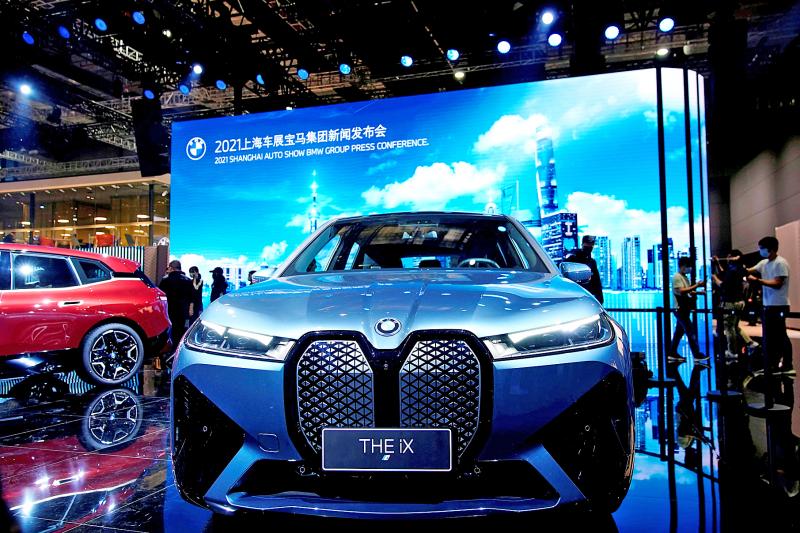BMW AG expects the global shortage of semiconductors hindering auto production to be resolved, as companies and governments zero-in on the issue.
“There’s intense focus on the issue globally, so it’s to be expected for supply and demand to be back in balance within two years at the latest,” BMW chief executive officer Oliver Zipse said in an interview on Thursday at the company’s driving academy near Munich, Germany.
A lack of chips used in everything from navigation systems to certain rear-view mirrors has forced automakers to curtail production just as demand picks up in major economies that are easing COVID-19 pandemic restrictions.

Photo: Reuters
While Ford Motor Co last month estimated the scarcity of semiconductors would slash earnings by US$2.5 billion this year, BMW has only reported limited stoppages at two European plants thus far.
Zipse’s optimistic view contrasts with some of his peers.
Renault SA CEO Luca De Meo on Thursday said the chip crisis has exposed the “frightening” fragility of complicated supply lines where whole industries depend on highly specialized manufacturers.
What were valid strategies 20 years ago should be revisited, he said.
Volkswagen AG cautioned the semiconductor shortage would become more pronounced in the second quarter, though it still raised its full-year earnings outlook.
BMW yesterday sent a similarly upbeat message, saying it expects automotive returns to reach the upper end of its 6 to 8 percent forecast.
Strong demand spreading from China to the US and Europe is helping offset higher prices for raw materials such as copper.
The chip shortages that arose after consumers snapped up electronic gadgets en masse while confined at home have spurred broad efforts to boost production. The European Commission plans to double the bloc’s chip production to at least 20 percent of world supply by 2030, a move that would reduce its reliance on foreign companies for the critical components.
US President Joe Biden has vowed to better secure the US’ supply chain by reviving domestic chip manufacturing.
Taiwan Semiconductor Manufacturing Co (台積電) plans to spend as much as US$28 billion on new plants and equipment this year.
While waiting for investment programs to gather pace, manufacturers have had little choice but to idle plants or take the unusual step of stripping certain high-tech features from select models.
Zipse said BMW has no plans to seek new partnerships or joint ventures despite current restraints.
“For critical components, we’ll stick with long-term supply contracts and a range of different partners,” he said.
This will include battery cells critical to accelerating BMW’s rollout of electric vehicles.
“From our point of view, we’ve covered the necessary supplies with long-term contracts,” he said.

SELL-OFF: Investors expect tariff-driven volatility as the local boarse reopens today, while analysts say government support and solid fundamentals would steady sentiment Local investors are bracing for a sharp market downturn today as the nation’s financial markets resume trading following a two-day closure for national holidays before the weekend, with sentiment rattled by US President Donald Trump’s sweeping tariff announcement. Trump’s unveiling of new “reciprocal tariffs” on Wednesday triggered a sell-off in global markets, with the FTSE Taiwan Index Futures — a benchmark for Taiwanese equities traded in Singapore — tumbling 9.2 percent over the past two sessions. Meanwhile, the American depositary receipts (ADRs) of Taiwan Semiconductor Manufacturing Co (TSMC, 台積電), the most heavily weighted stock on the TAIEX, plunged 13.8 percent in

A wave of stop-loss selling and panic selling hit Taiwan's stock market at its opening today, with the weighted index plunging 2,086 points — a drop of more than 9.7 percent — marking the largest intraday point and percentage loss on record. The index bottomed out at 19,212.02, while futures were locked limit-down, with more than 1,000 stocks hitting their daily drop limit. Three heavyweight stocks — Taiwan Semiconductor Manufacturing Co (TSMC, 台積電), Hon Hai Precision Industry Co (Foxconn, 鴻海精密) and MediaTek (聯發科) — hit their limit-down prices as soon as the market opened, falling to NT$848 (US$25.54), NT$138.5 and NT$1,295 respectively. TSMC's

TARIFFS: The global ‘panic atmosphere remains strong,’ and foreign investors have continued to sell their holdings since the start of the year, the Ministry of Finance said The government yesterday authorized the activation of its NT$500 billion (US$15.15 billion) National Stabilization Fund (NSF) to prop up the local stock market after two days of sharp falls in reaction to US President Donald Trump’s new import tariffs. The Ministry of Finance said in a statement after the market close that the steering committee of the fund had been given the go-ahead to intervene in the market to bolster Taiwanese shares in a time of crisis. The fund has been authorized to use its assets “to carry out market stabilization tasks as appropriate to maintain the stability of Taiwan’s

In a small town in Paraguay, a showdown is brewing between traditional producers of yerba mate, a bitter herbal tea popular across South America, and miners of a shinier treasure: gold. A rush for the precious metal is pitting mate growers and indigenous groups against the expanding operations of small-scale miners who, until recently, were their neighbors, not nemeses. “They [the miners] have destroyed everything... The canals, springs, swamps,” said Vidal Britez, president of the Yerba Mate Producers’ Association of the town of Paso Yobai, about 210km east of capital Asuncion. “You can see the pollution from the dead fish.